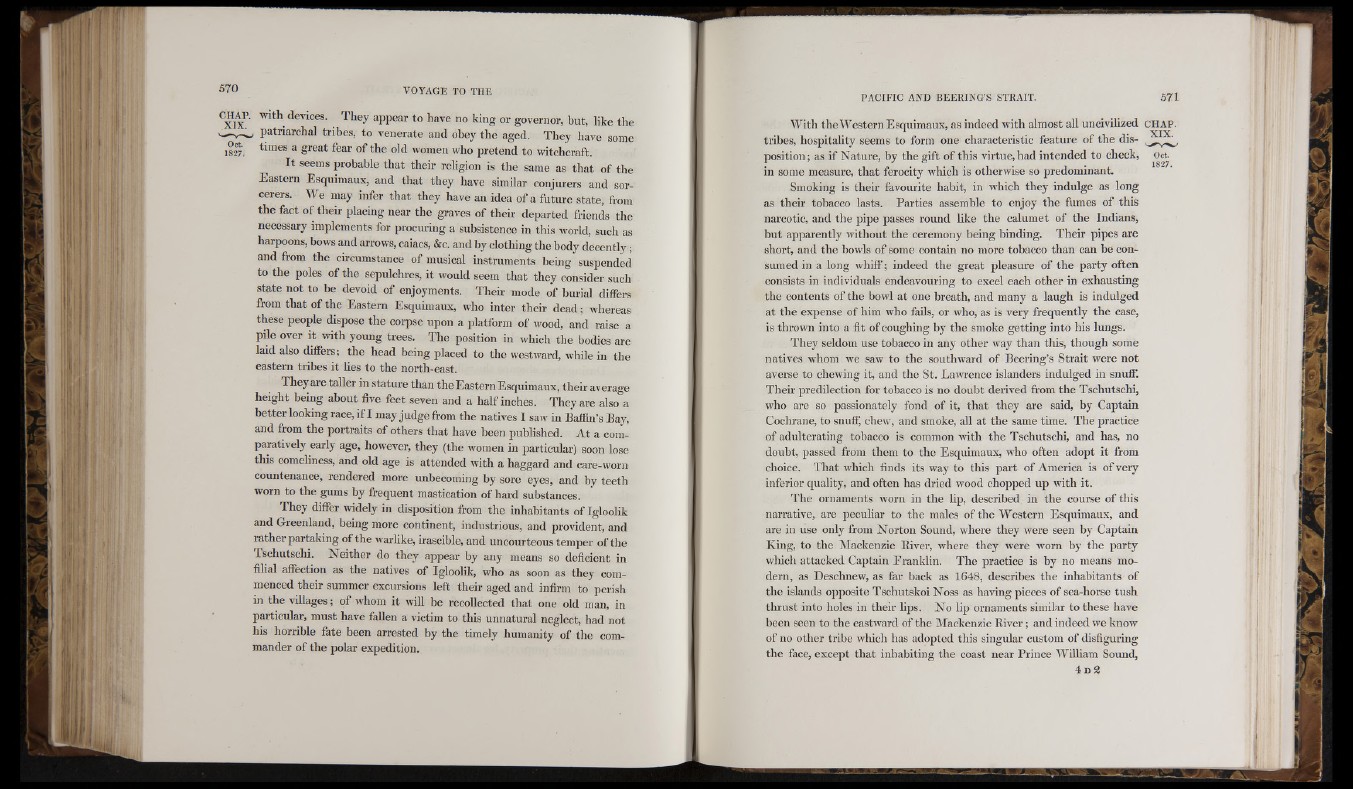
with devices. They appear to have no king or governor, but, like the
J patriarchal tribes, to venerate and obey the aged. They have some
times a great fear of the old women who pretend to witchcraft.
C H A P .
X IX .
''^oèT'
1827.
It seems probable that their religion is the same as that of the
Eastern Esquimaux, and that they have similar conjurers and sorcerers.
We may infer that they have an idea of a future state, from
the fact of their placing near the graves of their departed friends the
necessary implements for procuring a subsistence in this world, such as
harpoons, bows and arrows, caiacs, &c. and by clothing the body decently ;
and from the circumstance of musical instruments being suspended
to the poles of the sepulchres, it would seem that they consider such
state not to be devoid of enjoyments. Their mode of burial differs
from that of the Eastern Esquimaux, who inter their dead ; whereas
these people dispose the corpse upon a platform of wood, and raise a
pile over it with young trees. The position in which the bodies are
laid also differs; the head being placed to the westward, while in the
eastern tribes it lies to the north-east.
They are taller in stature than the Eastern Esquimaux, their average
height being about five feet seven and a half inches. They are also a
better looking race, if I may judge from the natives I saw in Baffin’s Bay,
and from the portraits of others that have been published. At a comparatively
early age, however, they (the women in particular) soon lose
this comehness, and old age is attended with a haggard and care-worn
countenance, rendered more unbecoming by sore eyes, and by teeth
worn to the gums by frequent mastication of hard substances.
They differ widely in disposition from the inhabitants of Igloolik
and Greenland, being more continent, industrious, and provident, and
rather partaking of the warlike, irascible, and uncourteous temper of the
Tschutschi. Neither do they appear by any means so deficient in
filial affection as the natives of Igloolik, who as soon as they commenced
their summer excursions left their aged and infirm to perish
in the villages ; of whom it will be recollected that one old man, in
particular, must have fallen a victim to this unnatural neglect, had not
his horrible fate been arrested by the timely humanity of the commander
of the polar expedition.
With the Western Esquimaux, i
1 indeed with almost all uncivilized C H A P
Oct.
1827.
tribes, hospitality seems to form one characteristic feature of the dis-
position; as if Nature, by the gift of this virtue,had intended to check,
in some measure, that ferocity which is otherwise so predominant.
Smoking is their favourite habit, in which they indulge as long
as their tobacco lasts. Parties assemble to enjoy the fumes of this
narcotic, and the pipe passes round like the calumet of the Indians,
but apparently without the ceremony being binding. Their pipes are
short, and the bowls of some contain no more tobacco than can be consumed
in a long whiff; indeed the great pleasure of the party often
consists in individuals endeavouring to excel each other in exhausting
the contents of the bowl at one breath, and many a laugh is indulged
at the expense of him who fails, or who, as is very frequently the case,
is thrown into a fit of coughing by the smoke getting into his lungs.
They seldom use tobacco in any other way than this, though some
natives whom we saw to the southward of Beering’s Strait were not
averse to chewing it, and the St. Lawrence islanders indulged in snuff.
Their predilection for tobacco is no doubt derived from the Tschutschi,
who are so passionately fond of it, that they are said, by Captain
Cochrane, to snuff, chew, and smoke, all at the same time. The practice
of adulterating tobacco is common with the Tschutschi, and has, no
doubt, passed from them to the Esquimaux, who often adopt it from
choice. That which finds its way to this part of America is of very
inferior quality, and often has dried wood chopped up with it.
The ornaments worn in the lip, described in the course of this
narrative, are peculiar to the males of the Western Esquimaux, and
are in use only from Norton Sound, where they were seen by Captain
King, to the Mackenzie Eiver, where they were worn by the party
which attacked Captain Franklin. The practice is by no means modern,
as Deschnew, as far back as 1648, describes the inhabitants of
the islands opposite Tschutskoi Noss as having pieces of sea-horse tush
thrust into holes in their lips. No lip ornaments similar to these have
been seen to the eastward of the Mackenzie Eiver; and indeed we know
of no other tribe which has adopted this singular custom of disfiguring
the face, except that inhabiting the coast near Prince AV’illiam Sound,
4 d 2